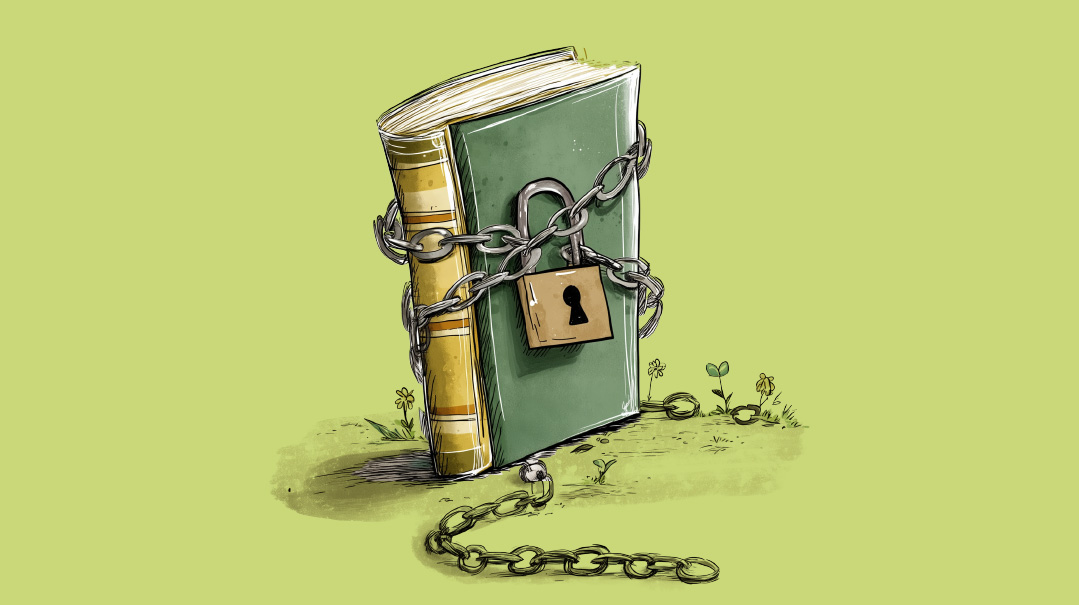Family First Inbox: Issue 777

"If Klal Yisrael can’t learn that the only perfection in the world is Hashem, then we will never be able to properly guide our students"

Sem for the Academic Student [Inbox / Issue 776]
I’d like to weigh in on the discussion about seminaries. I’m not looking to add fuel to the fire, but most opinions only took into account two sides of the story — the seminary principals and the weaker students. Has anyone considered the academic student?
Here’s my experience — and I know I’m not alone.
I grew up out of town, where I went to an established elementary and Bais Yaakov high school. We had some incredible teachers, both in limudei kodesh and secular studies. I was a super-academic student. In our secular studies we had honors opportunities, but that wasn’t an option for limudei kodesh.
I learned a lot from my incredible teachers, and I still refer back to those years for life lessons, but I was not intellectually challenged. For the most part, I felt frustrated in a classroom setting. It was just so slow-placed.
I attended a super-academic seminary, where I quite literally came alive. I can still picture myself sitting on the edge of my chair, my mind on fire, absorbing the insanely stimulating, thought-provoking lessons some of my teachers shared.
It felt as though I’d only used 1 percent of my brain until then, and I finally had the opportunity to use all my brainpower. I can’t possibly describe the utter thrill of it.
I was always a super-fun, outgoing, GO-president type of girl. But none of my regular, yeshivish friends were intellectual like me. And none of my teachers had ever fed that part of me in this way. But here I could speak intellectually, and it was NORMAL. There was so much material to absorb.
People today think seminary should be an extension of high school. Why should it be any different from the way things were in high school? It’s all about hashkafah and teaching girls how to be mothers in Klal Yisrael. But I honestly think that’s really not fair to the academic student. I think it’s a pity for an academic student to lose out on a time that can be dedicated to a “sharing of the minds” on this level.
I personally learned a lot from the “hard-core” stuff we learned, and don’t take well to “fluffy hashkafah” lessons. I like to see things inside, and that’s how my heart absorbs — through seeing lessons in writing. My seminary year gave me the skills I needed to excel in college and beyond. It literally opened my brain to a new capacity, and I can’t imagine where I’d be if I hadn’t had this opportunity.
Why is everyone pushing to get into the same few seminaries, instead of recognizing what their child really needs and sending them to a place that can suit a wider range of learning abilities? Why can’t there be amazing seminaries that aren’t the most intellectual, and that service a wider range of student body?
I think the main idea people need to work through is that a lot of the most intellectual seminaries are categorized as the “best” seminaries, and it doesn’t have to be that way. We equate the quality of the girl with her academics. That is simply false and misguided. One does not equal the other.
Much of the previous discussion about seminaries has been focused on the needs of the nonacademic students. But maybe we have to view the other side with compassion as well.
D.S., Lakewood
Teach Souls, Not Robots [Inbox / Issue 776]
What is our goal in chinuch? After all is said and done, our goal must be a deep, emotional, intellectual, and spiritual relationship to Hashem and His Torah, for each and every one of our students.
How we get there, engaging the mind and neshamah of every student, is another question.
The greatest educator of the past 100 years was our mother Sarah Schenirer. She engaged her students by every means possible. Nature, chesed, and yes, dear “Seminary Principal,” even CAMP. The girls were intellectually stimulated for real, because she engaged them in real life, not just through memorization and sitting nicely! Could she have known that her innovations in education were preparing her students to walk with their heads held high in the concentration camps and gas chambers? She reached deep into their souls and inspired them. They spiritually survived Gehinnom because their whole selves were spiritually uplifted.
We block our students’ ability to reach this emotional connection to Hashem when we turn learning into an academic exercise. Jewish education is so much bigger than that. It is so much more! We are robbing our students and chipping away at the mesorah when we snobbishly think that students who cannot “sit” are just somehow delayed or inferior. Maybe they are just not properly engaged?
If Klal Yisrael can’t learn that the only perfection in the world is Hashem, then we will never be able to properly guide our students. When we aim to educate robots and not human beings, with all of the nuances and challenges that would entail, we will not be successful in engaging the emotions and souls of our students.
Yael Feit, MA, Beitar
Building Torah [Inbox / Issue 776]
Over the years, I’ve followed many articles and letters to the editor about moving from chutz l’Aretz to live in Eretz Yisrael. After reading some of the letters in response to “Mountains around Jerusalem,” I’d like to share another perspective.
I preface with the following: I have always, and especially now as I “age,” yearned to live in Eretz Yisrael. With that being said, I would like to share a personal story that took place approximately 35 years ago, when we were newly married and visiting Eretz Yisrael for the summer.
Before my husband and I were engaged, we discussed the possibility of beginning our married life in Eretz Yisrael. My parents were graciously willing to support us and they owned an apartment in Eretz Yisrael. Yet my husband felt that his learning would be better in Lakewood. He also felt that as I was one of the oldest of a large family, we would end up going back and forth for many family simchahs, which would interrupt the continuity of his learning. (This was pre-Covid days, when it was almost unimaginable to miss a sibling’s chasunah or bar mitzvah.) I understood my husband’s concerns, and together we made the decision to live in America. But in my heart, it gnawed at me: Would we be held accountable for not moving to Eretz Yisrael when we so easily could have?
During our stay in Eretz Yisrael, we were zocheh to visit Rav Shach z”tzl (yes, I was present), and we asked this sh’eilah. Rav Shach answered, “Wherever you can learn better has a din of Eretz Yisrael.” Upon hearing the psak from the gadol hador, I felt a tremendous sense of relief.
As life panned out, I taught as my husband learned. My husband eventually became a maggid shiur and a menahel in a mesivta. Baruch Hashem — may we be zocheh to continue — we have taught hundreds of talmidim and talmidos.
It is also interesting to note that the gedolim of our generation did not make an “all out cry” that every Yid must pack their bags and move to Eretz Yisrael. That in and of itself is telling. But, possibly more important, is the following question that needs to be asked: Do we not have a responsibility to remain in chutz l’Aretz to help build and strengthen Torah and chesed for those remaining here? I understand that not everyone who is in chutz l’Aretz strengthens Torah and chesed, but nevertheless it is something to think about. Unfortunately, in our present galus, due to different circumstances, living in Eretz Yisrael may not be for everyone.
With respect and admiration for those who are zocheh to move to Eretz Yisrael, and for those who remain in chutz l’Aretz — until Mashiach’s arrival, may it come speedily in our days.
T.N.
Please Don’t Push [Windows / Issue 775]
I never wrote a letter before to Family First but your article on Tehillim hit home.
In preschool I aced my kriah homework. Sometimes I did it a bit slower than usual, but I always got it right. In first grade I began slowing down. In second grade I mumbled pesukim. I made sure to “forget” my homework all the time.
By the time my mother caught on as to how long it took me to read, I wasn’t interested in doing any more practice. My mother tried incentivizing me, but it didn’t work. My school pulled me out of class and that only became a battlefield for me to “prove” that I had no problem reading.
Fast-forward to now: I don’t read pesukim nor do I read any sheets given out. It’s too hard for me.
When someone asks me to “just” say one or two perakim of Tehillim, I am mortified when I need to turn them down, giving any reason on earth. And then they press, “You can’t find time for even one perek?”
It’s not that. Please don’t push me. It’s mental torture. I want to. Trust me I want to. But it’s beyond me by now.
A Teen
The Blessing of My Sunshine Girl [Lifetakes / Issue 771]
Dear Naomi Blau,
This letter is long overdue but I have to tell you how much your Lifetakes “Marks That Matter” meant to me. I too have a little sunshine girl and while running in circles to get her therapy (maybe it will teach her organizational skills? time management? responsibility?) I needed you to remind me of the beautiful brachah that she truly is. Absolutely loving and living life, too busy for nitty-gritty things like learning when school is just so much fun.
After I read your piece, I went to PTA with such pride for my middos-meidel instead of the slight dread I felt last year, and because of that, it was reflected by the teacher too!
The article is getting framed for future reference when I am asking her to get dressed for the tenth time and she is dancing in front of the mirror….
M.T.
Support for Parents of Addicts [Addicted to Change / Issue 768]
As the mother of a young adult in recovery, I really admire the writers and their gevurah. I was surprised to see no detailed resources for the parents of addicts. As a parent, I have found a lack of support for parents and families in our close-knit communities (perhaps these exist in the NY area). I attribute this to the novelty of addiction in our communities compared to the general population, as well as to the unique challenges we have as observant Jews. However, it is a very lonely, dark existence; I feel shame and failure as a parent.
Since my son started his recovery path, I became educated in the 12-Step programs. I learned that families also need their own recovery, because studies show that the most successful recovered addicts are those whose families were involved in their recovery.
FA (Families Anonymous) runs support groups for parents, although they aren’t specifically for any religious affiliation, which makes it a bit lonely. I feel that it is imperative to have Jewish parental and siblings groups in every community, and have just planted the seeds in my community to start one. I would be happy to share my outline and curriculum with anyone who might be interested in starting one in their community.
Mother of a son in recovery
Jarring Experience [One Marble at a Time / Issue 758]
In your Rosh Hashanah edition, there was an article about a woman who kept a marble jar and added a marble for each Shabbos she successfully observed as she was becoming more religious.
Our family was inspired by this and decided to keep a marble jar for the mitzvah of kavanah in bentshing (each family member according to their level). We just wanted to share the good news that baruch Hashem we have just filled our jar!
Thank you for adding meaning and inspiration to people’s lives.
L.B., Manchester, UK
(Originally featured in Family First, Issue 777)
Oops! We could not locate your form.






